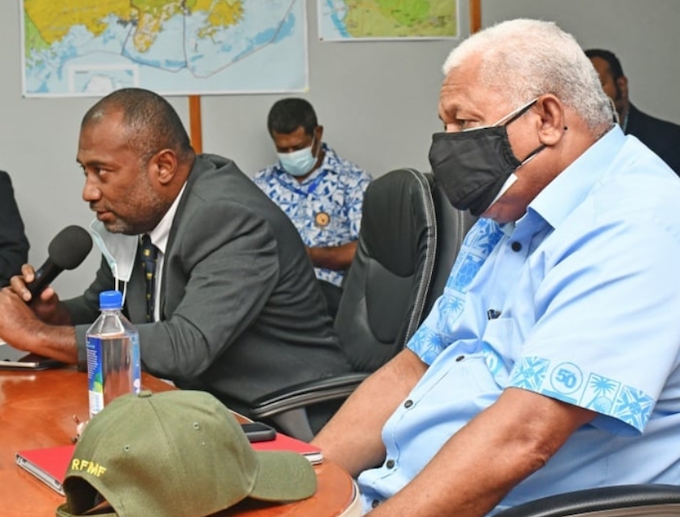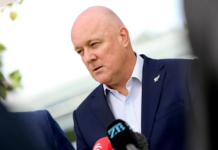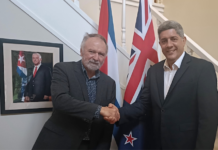
By Christine Rovoi, RNZ Pacific journalist
Calls for more action from the Fiji government are growing louder, as authorities appear to be losing their grip on a rapidly-growing outbreak of the covid-19 pandemic in the country.
Authorities have confirmed 147 cases in the last two days alone, and the country’s main hospital has been effectively sealed off, with Suva’s emergency department now operating from a field hospital at a stadium.
New Zealand Prime Minister Jacinda Ardern has called the situation in Fiji concerning, while health authorities there say the “serious developments” are impacting on their ability to respond.
Opposition and civil society groups say the escalating number of covid-19 cases are a clear indication the government is not in control of the crisis.
Despite calls for a lockdown, Prime Minister Voreqe Bainimarama has said there is no need to declare a state of emergency.
But the National Federation Party’s Professor Biman Prasad said the government must act now to avoid a disaster.
“This is a government that has lost the ability to think straight and it appears that it’s totally stranded,” he said. “Everyone must put out a proper strategy.”
Criticism becoming louder
Across the country, criticism of the government response is becoming louder, with political opponents charging that the government lacks a clear plan.
As the country’s covid situation has spiralled increasingly out of control, Fiji’s PR-savvy political leaders, who rarely shy away from a camera opportunity, have gone increasingly quiet.
“In the middle of Fiji’s biggest health crisis since independence, its minister-for-everything finds time to talk about local government reform, attack USP, lawyers, accountants and the NGOs,” Dr Prasad said.
“When numbers got out of control, the Prime Minister issued a rambling speech about Moses and the Israelites.”
The latest outbreak started when a soldier working at a mandatory isolation quarantine facility contracted the virus from a couple who had returned from abroad.
Now, there are more than 500 active cases across the country, with clusters at the Colonial War Memorial Hospital in Suva, the navy and military, a Suva supermarket, several villages and, now, the country’s main covid management team at the Ministry of Health, which has forced senior health leaders, including Health Secretary James Fong, into isolation.
And on Tuesday, the entire parliamentary complex in Suva was shut down after a staff member was identified as a primary contact of someone who had tested positive with the virus.
Precautionary measure
Speaker Ratu Epeli Nailatikau said that as a precautionary measure the parliamentary precincts would be closed until further notice.
“Our hospitals and even the health ministry headquarters have not been spared from its onslaught. This is largely due to lack of a coherent strategy to fight the pandemic,” said former prime minister Mahendra Chaudhry, who leads the Fiji Labour Party, which is not in Parliament.
There are growing calls — particularly from some NGOs — for a sustained nationwide lockdown in Fiji to stamp out cases, something which authorities say would be incredibly difficult to pull off in Fiji.
On Sunday, while warning that high numbers could be expected for a while yet, Dr Fong said in a written statement that more stringent measures were not needed.
“Thanks to the massive step-up in the pace of our testing, we can continue to fight this virus in a targeted way,” Dr Fong said.
“A way that allows Fijians to access essential services and allows the economy to function as normally and safely as possible.”
Health Minister Ifereimi Waqainabete also said there was no need to get too alarmed at the current numbers, adding that most were coming from identified clusters.
Coming from clusters
“What we must be looking at is the numbers in which they are coming from,” he said.
“As long as they are coming from within the clusters and as long as we are not getting many new community cases, then we know that the programmes that are in place are working.”
New Zealand’s Foreign Minister, Nanaia Mahuta, said her officials were in close contact with counterparts in Fiji about what help could be offered.
“It is concerning, and we are vigilant in terms of keeping in contact with Fiji and responding to their needs as they arise,” she said.
“However, Fiji is tasked with responding to an issue which we’ve all had to, and we’ve given our commitment in terms of PPE, e-gear support and also some financing.”
Mahuta added that a donation of 500,000 doses of covid vaccine was still on track to arrive in Fiji in July.
This week, Australia will send an additional 50,000 doses of the AstraZeneca vaccine to Fiji.
Fiji has had 751 covid-19 cases since March 2020, with 515 active cases and four deaths reported.
This article is republished under a community partnership agreement with RNZ.















































